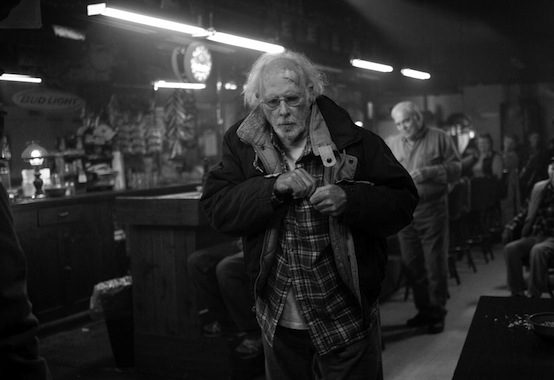Another Crack At Nebraska

I wrote my last write-up of Alexander Payne’s new movie a little too quickly, and as a consequence I think I gave it kind of a shallow once-over. Allow me to take the opportunity of having a blog to have another go.
I talked about the movie being a “slow thaw” in the cold relationship between father and son. A lot of that coldness relates to the son’s bitter feelings about his parents’ marriage – the sense that his parents were deeply unhappy with each other and that his father in particular never really wanted him or his brother. The first crack in the ice comes in a bar, where father and son share a round of beers. (It takes some doing to get that far; David has long since recognized his father’s alcoholism, and avoids drinking himself for that reason.) After a bit of lubrication, David finally starts to ask his father some of the things he really wants to know. Such as: why did you marry Mom? Answer: she wanted to. Did you love her, at the beginning? Answer: it never came up. Well, why did you have kids, then? Answer: I like to screw, and your mother’s a Catholic, so you figure it out.
These answers, needless to say, are not particularly satisfying to David. They sound like dime-store cynicism – an evasion rather than an answer. And David really wants to know this stuff because he’s been going through his own romantic troubles. His live-in girlfriend has just moved out and broken up with him, because she had to do something. “Get married, break up” – it almost doesn’t matter which. Just do something. And why doesn’t David just marry the girl? Well, as he asks his father at that bar, “how do you know you’re sure” that this person is the right person to make one’s life with. Woody, unsurprisingly, can’t make head or tail of this question. Because it’s a question about choices – and Woody hasn’t spent his life making choices.
Here’s Woody’s history, as pieced together from what we learn in the film. Once upon a time, Woody was a randy young man. As his wife, Kate, tells it, during a visit to the cemetery in Hawthorne, in that respect he was like all the other young men in town, who all wanted to get into her bloomers. (“They grow up staring at the rear-ends of cows, it’s no surprise they go crazy at the sight of a real woman.”) She wouldn’t drop her drawers for the guy who was too boring (she hitches up her skirt over his grave, saying “see what you could have had if you didn’t talk about wheat all the time?”) or any of the other guys chasing after her.
But she did put out for Woody. We know that because David meets another girlfriend of his dad’s from the old days, the woman who runs the town newspaper. She still has a soft spot for Woody, notwithstanding that she married a lovely man (now deceased) and had three lovely children, and now some grandchildren. She has no regrets; she just remembers him fondly. She lost him – and she knew she was going to lose him at the time, as she tells David, because she wouldn’t “let him get ’round the bases.”
Whereas Kate, presumably, would. She wanted him; she knew how to get him; she got him – and then she was stuck with him. Woody, meanwhile, married her because she wanted to – and because, as David says of him in another context, “he believes what people tell him.” Well, from what we hear of her, she probably told him a whole lot of things, many of them about himself. He probably believed them.
Anyway: my point isn’t to blame Woody (or Kate) for their unhappy marriage, and it’s not the movie’s point either – and you can tell because the movie gestures in the direction of making that an option, of pointing to bad choices and asking “what if,” and it pulls away toward a different conclusion. I read the movement of the movie as going from a kind of moral stance toward Woody’s non-chosen choices to something more compassionate. Should Woody have held out for the girl who wouldn’t put out? David looks like he’s wondering that at one point, in the newspaper offices; this other woman seems so . . . nice. Unlike his mother. Should Woody have reconciled himself to the brute facts of life earlier on, and not descended into bitterness and drink? That would seem to be Kate’s perspective. Was Woody a bad husband? A bad father? I think everyone in the audience thinks so – and we’re right.
But so what? That seems to be where David ends up. He finally takes his father to Lincoln – to learn that, as David knew, he hasn’t won anything. So David deceives his father into thinking he’s won a consolation prize: a new truck, with which he can drive through Hawthorne to show his old “friends” and neighbors and grasping relations that he won after all.
It’s not clear whether Woody understands that this is a deception or not, but of course David knows it is. He’s playing Edgar to his blind, foolish father’s Gloucester. And he’s giving his father a gift. It doesn’t matter whether Woody deserves that gift – indeed, he hasn’t done much of anything to deserve it. But it’ll make his father happy for a little while. He ends, in other words, in a place of compassion and pity for his father, which is a prerequisite, I would argue, for having compassion for himself – for the mistakes he’s made and will undoubtedly continue to make.
Comments